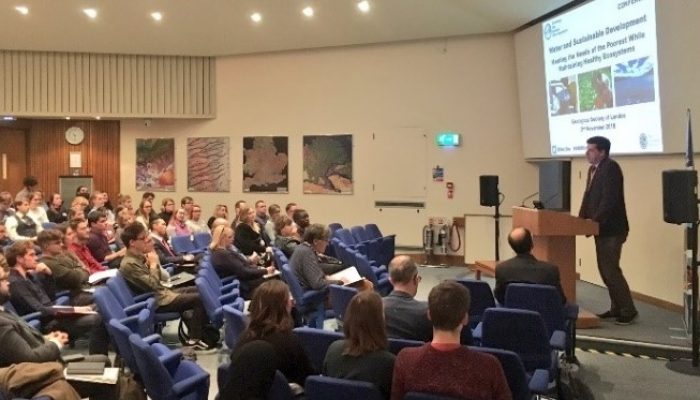
Understanding, managing and protecting water resources is critical to the delivery of the UN Sustainable Development Goals (e.g., education, water and sanitation, healthy oceans, zero hunger, good health, gender equality, energy, industry, and biodiversity). Increasing urbanisation, industrialisation, and climate change, however, are increasing pressure on water supplies and reducing water quality. Our 6th Annual Conference explored the role of geoscientists in managing conflicting demands for water, ensuring that the needs of the poorest are met while enhancing the health of ecosystems. We recently published a full event report online, and here we share some of the highlights.
Our Annual Conference is a highlight for many involved in the work of Geology for Global Development, bringing together people from across the UK and beyond to explore how geoscientists can contribute to sustainable development. This year approximately 120 attendees gathered at the Geological Society of London to talk about all things water, Sustainable Development Goals and geoscience.
The conference was opened by Lord Duncan of Springbank (UK Government Minister for Scotland and Northern Ireland, and a fellow geoscientist). Lord Duncan gave a passionate description of the important links between politics, geology and sustainable development. Another distinguished guest was Benedicto Hosea, visiting the UK from Tanzania and working closely with the Tanzania Development Trust. Benedicto gave us an insight into water resources in Tanzania, and the realities of implementing projects and taking practical action to improve water provision.
Our keynote lecture was delivered by Professor Bob Kalin from the University of Strathclyde, who gave us an overview of the interactions between water, geoscience and human impacts – and why it is important that geoscientists engage in the delivery of the Sustainable Development Goals. You can find a recording of a similar talk Professor Kalin presented at a TedX event.
The first panel discussion of the day focused on management, with insight from industry, academia and the Overseas Development Institute. We discussed the challenges involved in listening to and considering many stakeholders, the management of transnational aquifers and how best to enforce policy – then attempted to come with some solutions to these challenges. Our event report includes links to key reading suggested by our panellists.
Water contamination is a significant environmental issue in many countries at all stages of development. We heard about research into salinization and arsenic contamination of groundwater in Bangladesh. Mike Webster, head of WasteAid (check them out here) gave a different perspective on water contamination, talking about the work the charity has done in improving solid waste collection, thereby improving drainage and water quality.
Probably the most hectic, yet fun part of the conference was the UN style activity – we split up into groups representing different stakeholders and came up with a research and innovation statement relating to water and the SDGs.
We were also joined by The Eleanor Foundation, a charity working in Tanzania to provide access to safe, clean water provision to communities through pump installation and education programmes. It was so inspiring to hear about a charity that has undertaken effective work in ensuring the sustainable supply of water to communities, and made a real difference in improving lives – it is estimated that the Eleanor Foundation has improved access to water to over 250,000 people. In 2019, GfGD will be supporting the work of The Eleanor Foundation, helping to deliver SDG 6 in Tanzania. We will be using surplus income from our conference, together with other funds, to facilitate an evaluation of The Eleanor Foundation’s water programme. This will generate recommendations for The Eleanor Foundation team to ensure long-term impact and sustainability.
In true GSL conference style, we finished the conference with a reception in the library, giving us all the chance to chat about the conference and meet people sharing an interest in geoscience and development (of course admiring William Smith’s geological map!). I think it would be fair to say that a fun and interesting day was had by all, and I left feeling excited by the number of geoscientists I met that all share enthusiasm for the role that geoscientists have in helping to achieve the SDGs.
The 7th GfGD Annual Conference will be on Friday 15th November 2019, hosted again by the Geological Society of London. Please do save the date, and we hope to see you there!
Laura Hunt is a member of the GfGD Executive Team, and a PhD Student at the University of Nottingham and the British Geological Survey.
